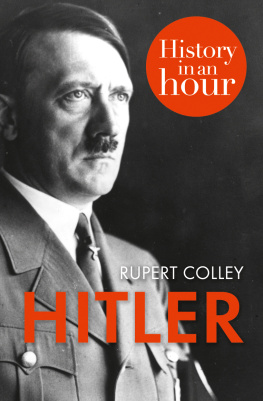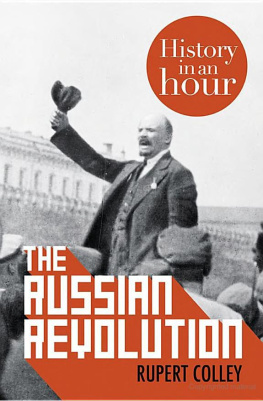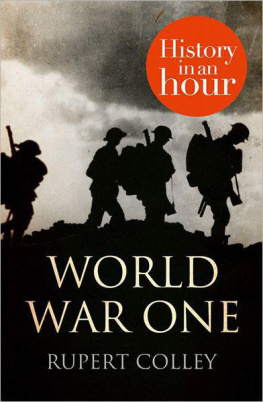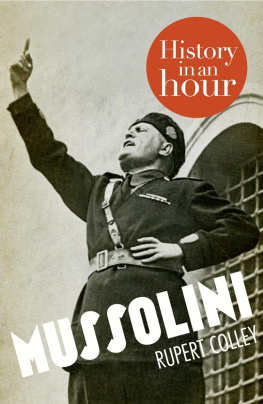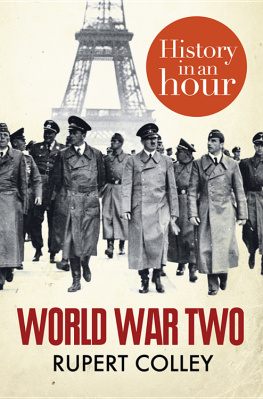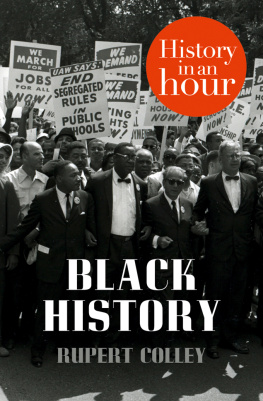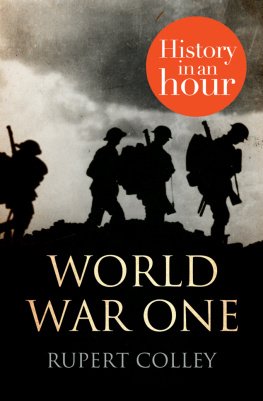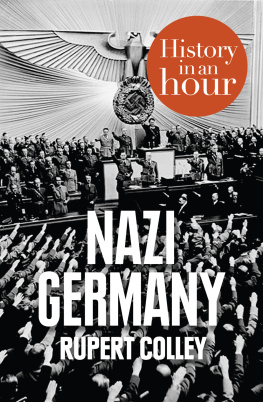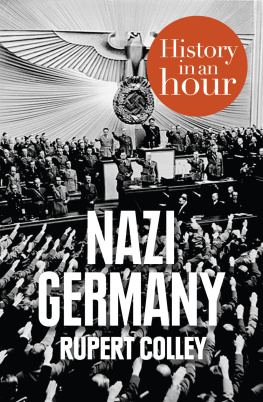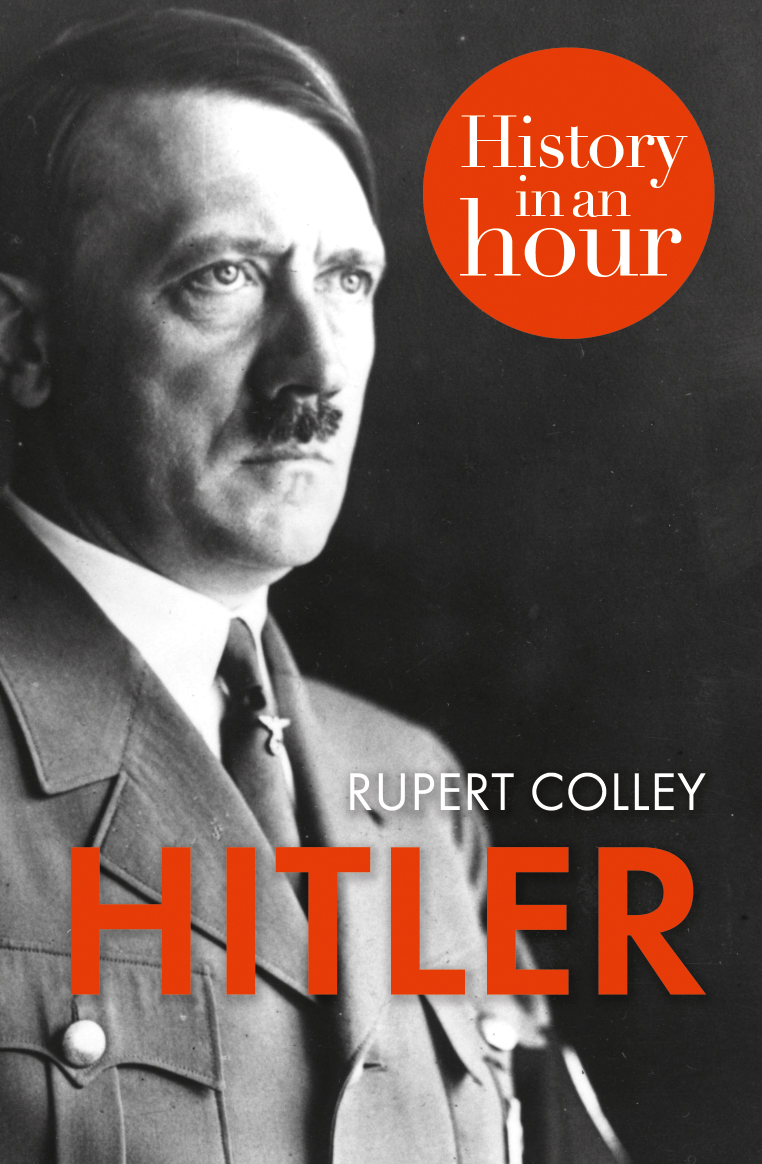
HITLER
History in an Hour
Rupert Colley

History in an Hour is a series of ebooks to help the reader learn the basic facts of a given subject area. Everything you need to know is presented in a straightforward narrative and in chronological order. No embedded links to divert your attention, nor a daunting book of 600 pages with a 35-page introduction. Just straight in, to the point, sixty minutes, done. Then, having absorbed the basics, you may feel inspired to explore further.
Give yourself sixty minutes and see what you can learn...
To find out more visit: http://historyinanhour.com or follow us on twitter: http://twitter.com/historyinanhour
Contents
What made a failed Austrian artist into the most reviled and destructive personality of the twentieth century? Where did the seeds of his rabid anti-Semitism lie? How did a marginalized loner become such a moving force in Germany? How could a nation have fallen for such a maverick? What made him so determined to bring about war?
This, in an hour, is the story of Adolf Hitler.
Klara Hitlers life was blighted with tragedy. Her first three children had all died as infants, and when she fell pregnant for a fourth time, the omens were not good. However, this child, born Easter Saturday, 20 April 1889, although sickly, survived. She named him Adolf.

Hitler as a baby, c.1889
Adolf Hitler was born in the village of Braunau am Inn, on the Austrian-German border, which Hitler, in the very first sentence of Mein Kampf, deemed providential as he was to unite the two countries.
The Hitler family moved several times, always depending on his father Alois job. Alois final posting was to a village on the outskirts of Linz where he retired and spent his final years. Adolf, who was five, was to retain a lifelong affection for Linz, which he always regarded as his home town.
Another boy, Edmund, was born in 1894 but lived for less than six years a devastating blow for the eleven-year-old Hitler. In January 1896 came a daughter, Paula, who survived and lived into adulthood. Klara had had six children but only two survived beyond infancy. But as well as her own two children, Klara looked after her two stepchildren, both from Alois second marriage. Alois, now in his final years, had no time for his children and preferred to wile away his time in the local tavern or looking after his bees. Often drunk, he repeatedly beat Adolf. Klara, who for many years still called her husband Uncle, smothered her son but was unable to prevent the thrashings.

Hitler as a schoolboy
Young Hitler (pictured above in the centre) did well at primary school but, following the death of his younger brother, less so at secondary where he was frequently criticized for his laziness and arrogance. But he was good at art and harboured ambitions to become an artist, a prospect that alarmed his father who wanted his son to follow him into the customs service. Hitler had no intention of holding down a dreary day job as his father had done all his working life and informed Alois of his artistic ambitions. According to Mein Kampf, Hitler Senior reacted with the words, Artist? No, never as long as I live.
But, on 3 January 1903, while enjoying his early morning glass of wine at the tavern, Alois collapsed and died. Cause of death was either a heart attack or stroke. He was sixty-five; his son thirteen.
Hitler, never enamoured with school, left at sixteen. His mother was disappointed but Adolf had inherited his fathers obstinacy and Klara was too soft to assert her authority. Hitler looked back on his years of education with an elemental loathing. Alois had left his family comparatively well off and Hitler, free of his fathers bullying and expectations, devoted his efforts to leading a life of idleness. Living in a flat in the centre of Linz, Hitler indulged in his painting by day and his love of the theatre and opera by night. Closeted from the real world by his mother, finding work was never high on Hitlers agenda.
In Linz Hitler made friends with a young man called August Kubizek, or Gustl. They became friends through their shared love of the operas of Richard Wagner, and while Hitler dreamt of becoming a great artist, Kubizek dreamt of becoming a conductor. In the evenings they would dress up and enjoy the opera or the theatre, but during the day, while Kubizek worked at his fathers upholstery workshop, Hitler lounged around, daydreaming. Kubizek was the compliant one of the two while Hitler voiced his opinion on everything, whether good or bad, and sometimes with unnerving passion, Kubizek quietly listened.
Kubizek noted how Hitler fell in love with a girl called Stefanie, but despite his overbearing arrogance in all other matters, he was too painfully self-conscious to try to strike up a conversation with the subject of his affections.
In early 1906, aged sixteen, Hitler visited Vienna for the first time. Staying only two weeks he returned to Linz which now seemed small and provincial in comparison. Hitler decided to apply for a place at Viennas Academy of Fine Arts and, in September 1907, despite his mothers reluctance and aided by a generous loan from his aunt Johanna, he moved to Vienna. Despite passing the initial exams, the would-be artist failed to secure a place. Of the 113 applicants only 28 passed so there was no shame involved but Hitler saw it as a failure and it struck him like a bolt from the skies. His examiners encouraged Hitler to concentrate on architecture instead.
Before Hitler left for Vienna, he and his sister, Paula, had learnt of their mothers breast cancer. Towards the end of 1907, Hitler received word that his mother was dying. He rushed back to Linz and nursed her, devotedly, through her final days. She died on 21 December 1907, aged only forty-seven. According to his mothers Jewish doctor, Edward Bloch, Hitler was with her as she died. I have never seen anyone, wrote Dr Bloch later, so prostrate with grief as Adolf Hitler. Later, Hitler presented the good doctor with one of his paintings. In Mein Kampf Hitler wrote of his parents: I had honoured my father but loved my mother. Hitler worshipped his mother and she was perhaps the only person he ever loved. Following her death, Hitlers contact with his family rapidly dwindled.
Hitler returned to Vienna in February 1908, but found that he was missing his only friend, Kubizek. He wrote to Kubizeks father to ask him allow his son to join him in the city, from where he could pursue his ambition to become a conductor. Kubizek Senior, who hoped that his son would follow him into the upholstery trade, reluctantly gave in. On 22 February, August Kubizek arrived in Vienna to be reunited with his friend.
Kubizek applied for a place at the University of Music and Performing Arts, Vienna and was immediately successful. Kubizek assumed his friend had already started his studies at the Academy of Fine Arts Hitler had not told anyone of his failure to gain a place. Eventually the truth came out and Hitler, beside himself with rage on telling of his lack of success, blamed everyone but himself.
While Kubizek studied, Hitler slept, daydreamt and came up with grandiose plans that came to nothing. In a fit of enthusiasm he began writing the libretto for an opera along Wagnerian lines, but the enthusiasm soon petered out. In October 1908, Hitler applied again for a place at the Academy of Fine Arts and again failed, this time at the initial stage. Again, he kept his failure to himself.
Next page
